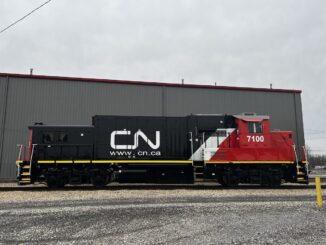MONTREAL is developing a fast-growing business supplying jet fuel to airlines serving Toronto’s Lester B. Pearson International Airport.
The effectiveness of CN’s rail pipeline for jet fuel to Pearson prompted the construction of a new Jet Fuel Rail Offloading, Storage and Distribution Facility near the airport, adjacent to CN’s Malport rail yard in northwest Toronto.
“The changing dynamics of jet-fuel supply for airlines serving Pearson airport now require the carriers to strategically source fuel across the globe, and this has opened the door to rail to play an increasingly important role in these longer supply chains,” said James Foote, executive vice-president, Sales and Marketing for CN. “We’ve developed a substantial business at Pearson – one that didn’t exist a half-decade ago – and we see potential for future jet-fuel traffic moves in Vancouver, Calgary and Winnipeg.”
New jet-fuel sourcing strategies in Canada follow the closing of some refineries and the decisions of some oil companies to shift production from aviation fuel to diesel and other distillates in greater demand. While only 10 per cent of Canada’s aviation fuel was imported eight years ago, imports accounted for 33 percent last year.
“The new Toronto transloading terminal is testament to the effectiveness of CN in assuring a continual flow of jet fuel for the airlines at Pearson. And we see further expansion in the future,” said James Fee, president of FSM Management Group Inc.
FSM administers the new Pearson rail jet fuel terminal on behalf of the 33-airline member Toronto Fuel Committee, which leases the facility from owner Pearson International Fuel Facilities Corporation. PIFFC owns all fuel facilities at Pearson, including the storage tanks, operation building and offices, hydrant carts and fuel tankers.
Fee said FSM expects to transfer 775,000,000 litres of jet fuel to the new terminal from tank cars in 2009, which will represent close to 40 per cent of Pearson’s annual requirement of two billion litres, based on an average of 20 tank cars per day.
Air Canada was the impetus for the new terminal. It began sourcing jet fuel for use at Pearson by rail from an import terminal near Quebec City six years ago. Until this year, the jet fuel was unloaded at a facility at CN’s main classification yard in York Region north of Toronto and trucked to the airport.
Paul Whitty, the carrier’s director of fuel purchasing and supply, said: “Our partnership with CN has enabled Air Canada to improve the economics of its fuel purchases. This is extremely important to us in a challenging environment for airlines.”
Rail infrastructure at the terminal includes track sidings permitting the unloading of 26 tank cars at once on two tracks. The initial phase of the new facility is almost fully utilized, and additional track is being constructed and expected to be in service by the third quarter of 2009 to add another 20 car spots for unloading.
CN transports jet fuel by rail to the Pearson terminal from a facility at the port in Quebec City, and from a CN WorldWide North America transload terminal in Flat Rock, Mich., supplied with product from Toledo, Ohio.
— PRNewswire-FirstCall



